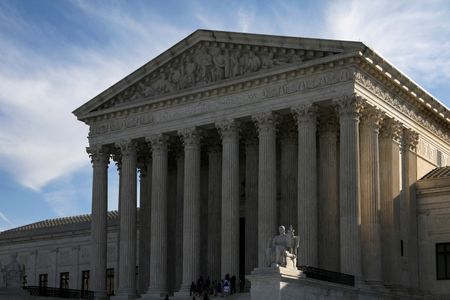By Dan Levine
(Reuters) -Democrats in the U.S. Congress proposed a raft of new rules for the federal judiciary on Wednesday including a formal mechanism to remove judges from hearing cases in the event of a conflict of interest and another intended to reduce secret court filings.
The legislation was being introduced in both the House of Representatives and the Senate. Among its sponsors are House Judiciary Committee Chairman Jerrold Nadler and Senate Judiciary Committee members Sheldon Whitehouse and Richard Blumenthal.
The bill comes as U.S. Supreme Court Justice Clarence Thomas has faced calls by some Democrats to recuse himself from any cases involving the Jan. 6, 2021, attack on the U.S. Capitol by former President Donald Trump’s supporters, citing the activities of the justice’s wife Virginia Thomas, a conservative political activist.
Under current practice, the nine Supreme Court justices individually decide whether to recuse themselves from a case because of a conflict of interest. Under the proposed legislation, the full Supreme Court would be required to review requests for recusal.
The proposed legislation also would require all federal judges to announce a compelling reason for sealing any document, and would require that the secrecy would last “no longer than necessary.” The bill would mandate public notice when a party has requested records to be sealed in a case and would direct judicial leaders to devise an inexpensive process for someone outside the case to contest a secrecy motion.
A spokesperson for the U.S. judiciary did not immediately respond to a request for comment.
Reuters revealed in a 2019 series “Hidden Injustice” how U.S. judges routinely allow makers of consumer products to file under seal information that is pertinent to public health and safety. (See Hidden Injustice series https://www.reuters.com/investigates/section/usa-courts-secrecy)
The Reuters investigation found that hundreds of thousands of Americans have been killed or seriously injured in recent decades by allegedly defective products – including drugs, cars and medical devices – while evidence that could have alerted consumers and regulators to potential danger remained hidden.
Though they are required in most of the regional circuits of the federal judiciary to explain why they allow records to be sealed, judges in cases involving defective products rarely do so, Reuters found.
In addition, the legislation would require the Supreme Court to provide live video of its oral arguments on the internet as well as other ethics guidelines for judges. The Supreme Court has not allowed video of its arguments but began allowing live audio in 2020 at the outset of the COVID-19 pandemic and has continued that practice.
It is the latest legislation pursued by some Democrats that would make changes in the federal judiciary.
Legislation unveiled last year that would expand the U.S. Supreme Court to 13 justices from the current nine – in a bid to erase its current conservative majority – drew an unenthusiastic response from the White House and top congressional Democrats and was denounced by Republicans.
(Reporting by Dan Levine in San Francisco; Editing by Will Dunham and Janet Roberts)












